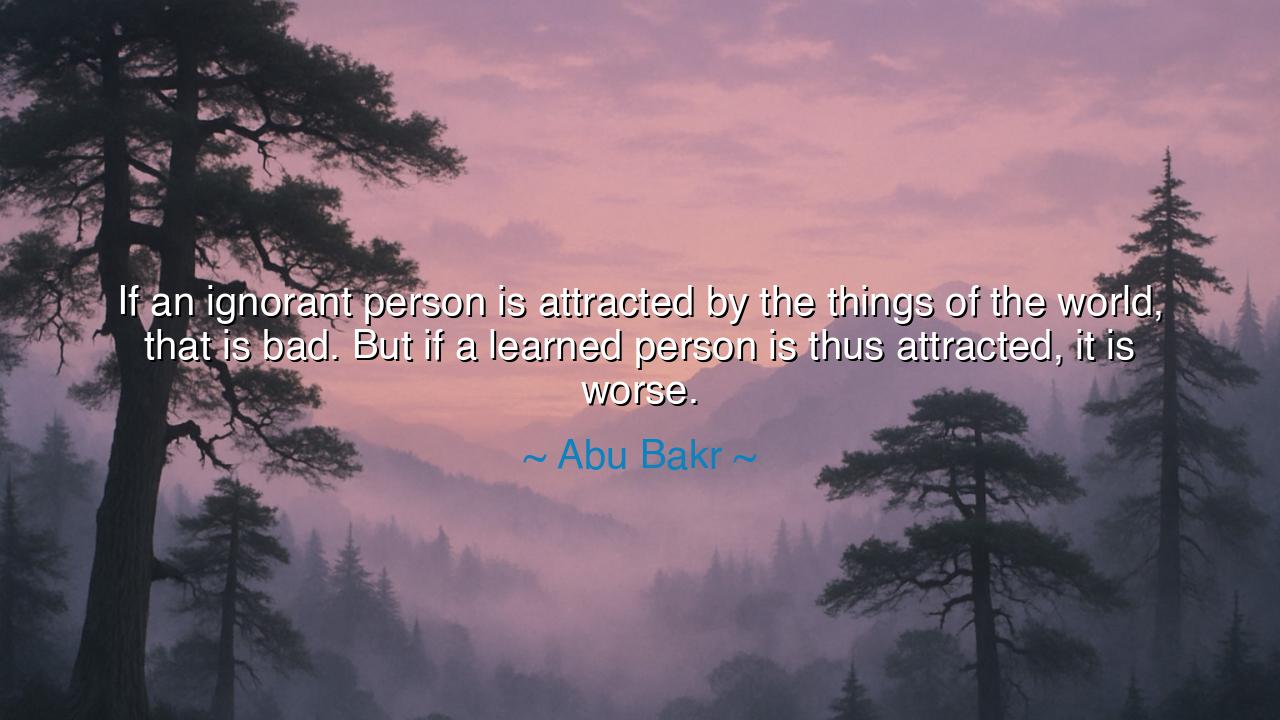
If an ignorant person is attracted by the things of the world
If an ignorant person is attracted by the things of the world, that is bad. But if a learned person is thus attracted, it is worse.






In the solemn and timeless words of Abu Bakr, the first caliph and companion of the Prophet, there shines a truth carved deep into the heart of human morality: “If an ignorant person is attracted by the things of the world, that is bad. But if a learned person is thus attracted, it is worse.” These words, spoken in an age of simplicity yet resounding across centuries, are a mirror held up to the soul — reflecting the sacred duty of knowledge and the peril that comes when wisdom bows before desire. Abu Bakr, a man of deep humility and faith, reminds us that to know is to bear responsibility, and that the fall of the wise is heavier than the folly of the unlearned.
To understand the origin of this quote, we must return to the dawn of Islam, when Abu Bakr al-Siddiq stood as one of the closest companions of the Prophet Muhammad. He was known not for riches or power, but for righteousness, truthfulness, and modesty. When he spoke of the “things of the world,” he meant not merely gold and luxury, but the illusions that bind the human heart — pride, greed, and the thirst for power. In his time, the newly formed Muslim community faced the temptations of success and expansion. Abu Bakr, knowing the fragility of the human soul, warned that knowledge without humility is more dangerous than ignorance itself. For the ignorant stumble in darkness, but the learned, when corrupted, lead others astray with their light.
This saying holds a wisdom that transcends faith and time. The ignorant person, drawn to the glittering world, may be forgiven, for they do not yet see clearly. Their hearts, though misled, have not yet known the discipline of truth. But the learned person, who has tasted the fruits of wisdom and seen the emptiness of material desire, should know better. When such a one succumbs to the same temptations, it is not ignorance that drives them, but arrogance — the arrogance of thinking themselves immune to weakness. Thus, their fall is deeper, their corruption more severe, and their example more harmful to others.
History offers many lessons to illuminate this truth. Consider the tale of Marcus Aurelius, the philosopher-king of Rome. Though born to rule an empire, he trained himself in the Stoic art of self-control, writing that the wise must never be slaves to pleasure or ambition. Yet around him, senators and scholars who claimed to be learned surrendered to greed and vanity, using their knowledge to justify their indulgence. Their wisdom, which should have been a lamp, became instead a shadow. Marcus, weary of the hypocrisy of the learned, echoed what Abu Bakr had warned centuries later: that the corruption of the wise poisons the world more deeply than the folly of the simple.
The learned, when seduced by worldly gain, become like priests of false gods — for they twist truth into justification, using knowledge not to elevate others, but to excuse their own desires. The ignorant may err from blindness, but the wise sin by choice. Abu Bakr’s warning is not merely about morality; it is about the sacred trust that comes with knowledge. Every scholar, every leader, every teacher holds in their hands the hearts of others. To betray that trust by loving the world more than truth is to violate the very gift that sets them apart. For the greater the light, the greater the shadow when it turns from its purpose.
And yet, Abu Bakr’s words are not only condemnation — they are also a call to purity of heart. He reminds us that true wisdom is not in knowing much, but in desiring little. To be learned is not to fill the mind with words, but to empty the soul of greed. The wise must wear humility as their armor, for the knowledge that lifts the spirit can also destroy it if it is not tempered by restraint. In this, his teaching aligns with that of the ancients — Confucius, who said that virtue is the root of all learning, and Socrates, who declared that wisdom begins with knowing one’s own limits.
The lesson, therefore, is both stern and beautiful: do not let learning become pride, nor wisdom become vanity. If you seek knowledge, seek it as a means to purify the soul, not to glorify the self. Let your study lead to compassion, not superiority. And if ever the world tempts you with riches, honors, or applause, remember that such things fade, but integrity endures. Better to be poor in possessions and rich in virtue than to know all things and lose the light within.
So, my listener, take to heart the wisdom of Abu Bakr. The world will forever beckon with its false promises — but do not be deceived, especially if you have learned its nature. For to know truth and to still chase illusion is to betray both knowledge and the self. Let your learning make you humble, your wisdom make you kind, and your faith — whatever its form — keep you steadfast. For the true measure of a learned person is not the breadth of their knowledge, but the depth of their purity. In this lies the greatness of the soul — to walk in wisdom, untouched by the glitter of the world.






AAdministratorAdministrator
Welcome, honored guests. Please leave a comment, we will respond soon